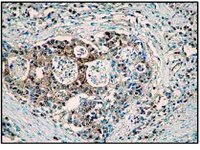Xenon is not superior to isoflurane on cardiovascular function during experimental acute pulmonary hypertension.
A B Roehl,P Steendijk,R Rossaint,C Bleilevens,A Goetzenich,M Hein
Acta anaesthesiologica Scandinavica
56
2011
Pokaż streszczenie
Acute right ventricular afterload increase is a known perioperative challenge for the anaesthetic regime especially for patients with a compromised right ventricle. The accused negative inotropic action of volatile anaesthetics, with the exception of xenon, might be crucial for the adaptation of the right ventricle. | 22260254
 |
Ras signaling in NGF reduction and TNF-?-related pancreatic ? cell apoptosis in hyperglycemic rats.
Selda Gezginci-Oktayoglu,Sehnaz Bolkent
Apoptosis : an international journal on programmed cell death
17
2011
Pokaż streszczenie
Recent evidence suggested that tumor necrosis factor-alpha (TNF-?) and nerve growth factor (NGF) withdrawal activated a common apoptotic pathway. Here, we aimed to investigate the possible role of apoptotic Ras effectors RASSF1 and NORE1 in NGF reduction and TNF-?-related ? cell apoptosis in streptozotocin (STZ)-induced hyperglycemic rats. Rats were divided into four groups: the first group was given saline and citrate buffer, the second group was injected 4-methylcatechol (4-MC), an inducer of NGF synthesis, the third group received STZ, and the fourth group was given both 4-MC and STZ. 4-MC (10 ?g/kg) was administered by daily intraperitoneal injection for 10 days before the animals were rendered hyperglycemic by administration of single dose STZ (75 mg/kg). With 4-MC pretreatment to hyperglycemic rats the following results were noted: (i) Decrease in pancreatic NGF level was blocked, (ii) Increase in pancreatic TNF-? level and the number of TNF-?(+) beta cell in the islets were prevented, (iii) Increase in the number of ? cell synthhesized apoptotic Ras effectors that RASSF1 and NORE1 was blocked, (iv) While pancreatic lipid peroxidation level decreased, antioxidant molecule glutathione and antioxidant enzymes glutathione peroxidase, catalase and superoxide dismutase activities increased, (v) Pancreatic caspase-3 activity and the number of cleaved caspase-3(+) ? cells were decreased. These results strengthen the idea that TNF-? and reduction in NGF can activate a common apoptotic pathway. Moreover, these data display that new apoptotic Ras effector molecules RASSF1 and NORE1 play important role with oxidative stress in NGF reduction and TNF-?-related pancreatic ? cell apoptosis in hyperglycemic rats. Furthermore, these findings suggest that 4-MC can prevent ? cell apoptosis possibly through increasing NGF synthesis in hyperglycemic rats. | 21938476
 |
Involvement of oxygen-regulated protein 150 in AMPK-mediated alleviation of lipid-induced endoplasmic reticulum stress.
Wang Y, Wu Z, Li D, Wang D, Wang X, Feng X, Xia M
J Biol Chem
2010
Pokaż streszczenie
Hepatocytes show endoplasmic reticulum (ER) stress when exposed to lipotoxic stimuli such as hyperlipidemia. Recent work has revealed that adenosine monophosphate activated protein kinase (AMPK) can mitigate ER stress. In this study, we investigated the impact of AMPK on lipid-induced ER stress in hepatocytes and its underlying molecular mechanism. Treatment with 5-aminoimidazole-4- carboxamide ribonucleotide (AICAR), an AMPK agonist, or overexpression of a constitutively active AMPK (CA-AMPK) significantly suppressed lipid-mediated ER stress, leading to marked protection against lipotoxic death. Incubation with AICAR and CA-AMPK overexpression induced the expression of an ER-associated chaperone, 150-kDa oxygen-regulated protein (ORP150), at both the mRNA and protein levels in hepatocytes. Forkhead box O1 (FOXO1) was identified as the critical transcription factor regulating ORP150 expression because silencing FOXO1 expression prevented the induction of ORP150 expression by AMPK. In contrast, overexpression of FOXO1-ADA promoted ORP150 expression in hepatocytes. FOXO1 bound directly to the ORP150 promoter, which was enhanced upon in the presence of AICAR. AMPK acts to activate FOXO1 by increasing its deacetylation and transcriptional activity via silent mating type information regulation 2 homolog 1 (SIRT1). Furthermore, AICAR infusion enhanced ORP150 expression, resulting in the marked amelioration of hepatic ER stress and apoptosis in C57BL/6J mice fed a high-fat diet. Our results reveal a novel mechanism by which AMPK regulates ER homeostasis in hepatocytes and suggest that AMPK has a protective role against hypercholesterolemia-related liver damage. | 21296878
 |












